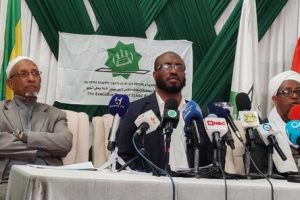
Using the Forum of Federations, Ambassadors of Belgium and Brazil expressed their readiness to work hand in glove with the Ethiopian government in its ongoing efforts of implementing effective federal system of governance.
Both countries as well would share their respective best experience in constitutional federalism with Ethiopia’s legislators in a continuous manner.
Approached by The Ethiopian Herald in connection with the 13thNations, Nationalities and People’s Day, Belgian Ambassador François Dumont says that Ethiopia is one of the key partner countries of the Interuniversity Cooperation for development with the Flemish Inter university Council, supported by the Belgian cooperation for development.
According to the Ambassador, the new experience sharing program is more at academic level and the University of Leuven, a research university based in Leuven, Belgium has currently developed an Ethiopian-Belgian federalism research project.
The research project aims to examine Ethiopian federalismthrough the lens of federal theory and creating ties between Ethiopian and Belgian federal theory, Ambassador Dumont adds.
For his part Brazil’s Chargé d’ affaires to Ethiopia, João Marcelo Montenegro Pres says the two countries are working closely to form experience sharing platform for constitutional federalism experts taking in to consideration the benefit of the engagement that could bring in their respective systems of governance.
Expressing federalism as democracy based on the process of dialogue, the Chargé notes that his country wants to learn from Ethiopia’s federalism experience and share its own successes so as to keep the dynamics of the mode of governance and ensure the betterment of the mass.
Furthermore, the existing consultative dialogues and experience sharing programs would be enhanced.
Regarding Belgian federalism experience, Ambassador Dumont states that Belgium is a Federal State made up of Communities and Regions and has three communities namely the Flemish, the French and the German-Speaking Community which is largely linguistic based as of Ethiopia. Belgium has also three and three regions (the Walloon Region, the Flemish Region and the Brussels-Capital Region).
Like Ethiopia, each state in Belgium is autonomous and they have parliaments, the members of which are directly elected and a government, which is distinct from the Federal State’s legislative and executive power. Belgium’s Federal Government holds the responsibilities that are not allocated to Federated entities too.
According to the Ambassador, the Belgian autonomy allows each region or community to exercise its competences internally and externally without consulting other institutions or the Federal State. “In some cases, including international relations, scientific research, or the development of common initiatives, however, the State and the Communities and Regions are required to respect ‘federal loyalty’ in the exercise of their competences.”
Ambassador Dumont points out that the relationship between the State and the federated entities in Belgium is not one of subordination, but one of equality and the State does not have control over the Communities’ and Regions’ legal acts. The judges of the Belgian Constitutional Court check the conformity of laws and decrees or orders with some rules of the Belgian Constitution and with the rules of allocation of powers between the Federal state, the Communities and Regions.
Concerning Brazil, the Chargé says that Brazilian system of governance has three levels namely cities, towns, (municipalities) and the state of the federation, the union Brazil as a state. Alike Ethiopia, there is a division of resources and responsibilities between the federal and state governments, João notes, adding that the federal government and states share responsibility in health, education, infrastructure too.
He states that Brazil has a fiscal responsibility law that regulates revenues, taxes and expenditure and determine how each state and city can use the money and the amount they could spend and to each level they could indebt themselves. Roughly, between 60-70 percent of the revenue remains in the federal government and the rest is divided between municipalities and states.
Noting the gap between the federal and state governments may become a source of divergence, the Chargé indicates that Brazilian legislators made meticulous efforts to produce constitution that clearly defining the different responsibilities and capacities of each level of the federal government. Ethiopian constitution is also vividly depicted the structure and division of power between the federal and state governments.
João points out that Brazil’s federalism is primarily based on geography and it does not allow cessation of states from the union, both principles are different from Ethiopia.In Brazil, however, each state and city entitled to decide if they want to separate themselves from the fusion from other cities and states.
Both diplomats reiterate their countries commitment for the continuation of cooperation with Ethiopia on federalism, adding that universities and other higher education institutions would carry on studies and consultative meetings with Ethiopian counterparts on democratic governance.
Herald December 8/2018
BY BILAL DERSO





